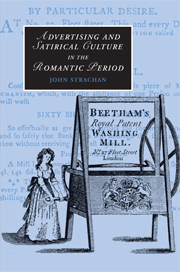Book contents
- Frontmatter
- Contents
- List of illustrations
- Acknowledgements
- Introduction
- 1 A ‘department of literature’: Advertising in the Romantic period
- 2 ‘Humbug and Co.’: Satirical engagements with advertising 1770–1840
- 3 ‘We keeps a poet’: Shoe blacking and the commercial aesthetic
- 4 ‘Publicity to a lottery is certainly necessary’: Thomas Bish and the culture of gambling
- 5 ‘Barber or perfumer’: Incomparable oils and crinicultural satire
- 6 ‘The poetry of hair-cutting’: J. R. D. Huggins, the emperor of barbers
- Conclusion: ‘Thoughts on puffs, patrons and other matters’: Commodifying the book
- Notes
- Bibliography
- Index
- CAMBRIDGE STUDIES IN ROMANTICISM
Conclusion: ‘Thoughts on puffs, patrons and other matters’: Commodifying the book
Published online by Cambridge University Press: 22 September 2009
- Frontmatter
- Contents
- List of illustrations
- Acknowledgements
- Introduction
- 1 A ‘department of literature’: Advertising in the Romantic period
- 2 ‘Humbug and Co.’: Satirical engagements with advertising 1770–1840
- 3 ‘We keeps a poet’: Shoe blacking and the commercial aesthetic
- 4 ‘Publicity to a lottery is certainly necessary’: Thomas Bish and the culture of gambling
- 5 ‘Barber or perfumer’: Incomparable oils and crinicultural satire
- 6 ‘The poetry of hair-cutting’: J. R. D. Huggins, the emperor of barbers
- Conclusion: ‘Thoughts on puffs, patrons and other matters’: Commodifying the book
- Notes
- Bibliography
- Index
- CAMBRIDGE STUDIES IN ROMANTICISM
Summary
PUFFING – a species of cozenage and trickery much resorted to by the vendors of quack medicines, blacking, novels, and other trash, for the purpose of gulling the public and cajoling them into a purchase of their wares.
Horace Smith, The Tin Trumpet (1836)Coal-burn him in Beelzebub's deepest pit.
Charles Lamb on Henry Colburn (letter to P. G. Patmore, 10 April 1831)During the 1820s and 1830s, the increasingly sophisticated promotional techniques of contemporary publishers such as Richard Bentley, Frederick Mansell Reynolds, Thomas Tegg and, most significantly, Henry Colburn provoked some unease among poets and essayists, notably in a feeling that books were being marketed in the same way as more mundane products such as blacking, hair oil or lottery tickets. A series of essays and satires by literary figures such as John Clare, Thomas Hood, John Hamilton Reynolds, Robert Montgomery and Thomas Babington Macaulay directly compare the marketing tactics employed to sell consumer goods with the techniques used by what one might label the manufacturers in their own trade, the publishers. In Robert Montgomery's words, ‘Novels can be crammed down the public, just in the same style as … Kalydor, Blacking, Champagne, and other bottled wonders’; the likes of Colburn have made themselves indistinguishable from Alexander Rowland the younger, Robert Warren or Charles Wright. A discussion of brand marketing informed literary journalists' and satirists' discussions of the contemporary publishing business.
- Type
- Chapter
- Information
- Advertising and Satirical Culture in the Romantic Period , pp. 253 - 269Publisher: Cambridge University PressPrint publication year: 2007



